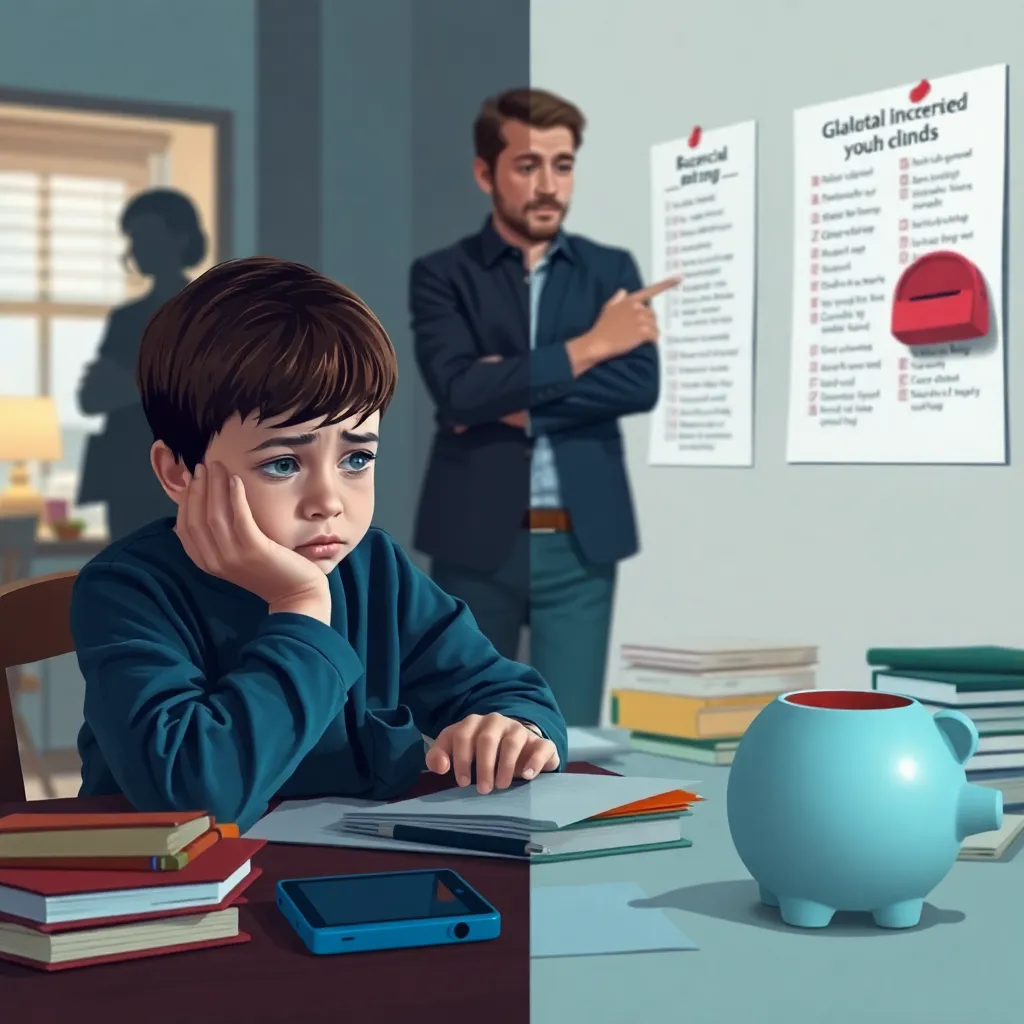In the delicate realm of family dynamics, it’s not uncommon for parents to unintentionally cross boundaries, sometimes leading to the exploitation of their children. While this may not always be easy to recognize, understanding these hidden signs is crucial to preserving the emotional well-being of your family. You might be feeling a mix of confusion and concern, wondering if certain behaviors are harming those you love most. It’s perfectly normal to seek clarity and reassurance when it comes to the complex relationships within your family.
Recognizing the subtle signs of exploitation can be a vital step toward fostering a nurturing environment where every family member thrives. This article is designed to guide you through the nuanced indicators that may reveal an imbalance in your familial interactions. By equipping yourself with this knowledge, you can take meaningful steps to adjust and improve the dynamics at home. You deserve to feel empowered in your journey to support and protect your children, ensuring their growth is unhindered by undue pressure or expectations.
Throughout this article, we’ll explore ten often-overlooked signs that parents might be exploiting their children, offering insights that are both practical and compassionate. We’ll delve into the emotional and behavioral cues that can signal a need for change, helping you to better understand and address these issues. Our goal is to provide you with the tools necessary to create a loving, respectful family environment. With this understanding, you can help ensure that your children’s needs are met in a way that supports their independence and happiness.
1. Unreasonable Financial Demands

In some families, children may face the pressure of meeting unreasonable financial demands from their parents. This often involves being asked to contribute to household expenses in ways that are not age-appropriate or financially feasible for them.
Imagine a young adult who just started their first job, only to find themselves paying for family bills instead of saving or investing in their own future. Such situations can lead to a build-up of resentment and stress, as the child struggles to balance their own needs with the family’s expectations.
Experts suggest that this dynamic can create an unhealthy cycle of guilt and obligation, where children feel their primary role is to financially support their parents. In these scenarios, it’s crucial for children to set clear boundaries and communicate openly to prevent exploitation.
When dealing with unreasonable financial demands, consider engaging a family counselor to mediate discussions. This can help all parties understand how to balance familial support with individual financial goals.
Ultimately, addressing these challenges requires a supportive and empathetic dialogue that recognizes the importance of financial independence for children. By fostering healthy communication, families can ensure that their relationships remain nurturing and respectful.
2. Constant Public Exposure

When parents frequently showcase their children on social media, it might appear as innocent pride. However, this constant public exposure can sometimes cross the line, exploiting a child’s privacy for likes and shares. Consider a scenario where a parent posts daily updates of their child’s activities, potentially opening them up to unwanted attention from strangers. This can create a digital footprint that the child has no control over, which might impact them in unforeseen ways later in life.
In many cases, children aren’t given a choice about their online presence, which can lead to feelings of being used. It’s essential for parents to reflect on whether their actions are truly in the child’s best interest or if they’re seeking validation through their child’s achievements. Parents need to balance the desire to share joyful moments with the need to protect their child’s right to privacy. By doing so, they foster a safer and more respectful environment for their child to grow up in.
Experts emphasize the importance of setting boundaries when it comes to sharing personal information online. Dr. Emily Green, a family therapist, suggests that parents ask themselves if they would be comfortable with the same level of exposure. She advises parents to consider the long-term implications of each post, ensuring their child won’t feel exploited or embarrassed by the content shared during their early years.
Ultimately, the goal is to cherish and celebrate children’s milestones without compromising their privacy. By prioritizing their well-being, parents can enjoy sharing moments in a way that is both respectful and meaningful. This approach helps to build a foundation of trust and understanding, which is crucial for any healthy parent-child relationship.
3. Inappropriate Emotional Burden

Children should not bear the weight of adult emotions, yet sometimes parents inadvertently place an inappropriate emotional burden on them. For instance, a parent might confide in their child about financial struggles or relationship woes, seeking comfort as if the child were a peer.
This dynamic can lead to the child feeling overwhelmed and responsible for their parent’s well-being. It’s crucial to remember that children are not equipped to handle such pressures, and this can lead to anxiety and stress for them.
In some families, a child might become the primary confidant, especially in single-parent households. While this might seem like a sign of closeness, it can blur the boundaries between parent and child, leading to emotional strain.
Experts suggest maintaining clear boundaries by seeking adult support systems for adult issues. This ensures that the child can continue to enjoy their childhood without the unnecessary weight of adult concerns.
Being mindful of the emotional load placed on children helps foster a healthy family dynamic. Ensuring children feel safe and supported without adult burdens is a gift that allows them to thrive emotionally and mentally.
4. Unmet Basic Needs

When children’s basic needs go unmet, it can signify deeper issues within the family dynamic. A child consistently lacking proper nutrition, clothing, or shelter may be a victim of parental neglect, which is a subtle yet damaging form of exploitation.
Neglecting these essentials often stems from parents prioritizing their own needs or desires over their child’s well-being. In some cases, parents may be struggling themselves, but it’s crucial to recognize when a child’s needs are being sacrificed continually.
Consider a family where the parents frequently spend money on entertainment while their child lacks proper clothing for school. This scenario might appear harmless on the surface but reflects a significant imbalance in meeting the child’s fundamental requirements.
Experts suggest that meeting a child’s basic needs is foundational for their healthy development. Ensuring these needs are met not only nurtures their growth but also fosters a sense of security and trust in their caregivers.
5. Excessive Control Over Choices

In many families, parents may exert excessive control over their children’s choices, often under the guise of guidance. For example, a parent might insist on choosing their child’s hobbies or career path, leaving little room for the child’s own interests and aspirations.
Such control can be masked as concern but can significantly impact a child’s ability to make independent decisions. Children raised in such environments might struggle with self-confidence, feeling that their choices are never truly their own.
Imagine a teenager who loves art but is pushed into sports because it’s what the parent values. This can lead to a sense of resentment and a feeling of being misunderstood, which can strain the parent-child relationship.
To foster a healthier dynamic, parents can focus on being supportive guides rather than decision-makers. Encouraging open conversations about choices and respecting children’s opinions can empower them to grow into more self-assured individuals.
By shifting from control to support, parents can nurture a child’s sense of autonomy and confidence. This approach not only strengthens the parent-child bond but also prepares children to face the world with resilience and independence.
6. Lack of Personal Privacy

A subtle yet telling sign of parental exploitation is the consistent disregard for a child’s personal privacy. In many households, this might manifest as parents frequently invading their child’s space without consent, such as entering their room unannounced or reading their private messages. These actions can leave a child feeling deprived of autonomy, fostering an environment where their boundaries are not respected. Such an atmosphere can lead to a child developing issues with trust and personal boundaries in their future relationships.
Consider a scenario where a parent insists on knowing every detail of their child’s life, from friendships to personal thoughts. While staying informed about a child’s life is important, overly invasive behaviors can lead to feelings of resentment and suffocation. This behavior can also hinder a child’s ability to develop independent decision-making skills, as they may feel they are constantly under scrutiny and unable to make choices freely.
Experts in child psychology often stress the importance of respecting a child’s right to privacy to promote healthy psychological development. Allowing children to have their own space and secrets can encourage a sense of self-worth and personal responsibility. By fostering an environment where privacy is respected, parents can help their children learn to balance their own privacy needs with the demands of relationships, a crucial life skill.
By ensuring that a child’s privacy is respected, parents can strengthen their relationship with their child, built on mutual respect and trust. This approach not only enhances the child’s sense of independence but also solidifies a foundation of trust and understanding within the family. Ultimately, respecting a child’s privacy can empower them to develop into emotionally healthy individuals who value both their own and others’ boundaries.
7. Conditional Affection Displays

In some families, parents may show affection only when their children meet certain expectations, which can create a sense of conditional love. Children can feel they need to earn love by performing well in school or behaving in a specific way, leading to an unhealthy pressure to always be perfect.
Imagine a child who receives hugs and praise only when they bring home an A on their report card. This type of conditional affection can leave children feeling unloved when they don’t meet these standards, affecting their self-esteem and emotional development.
Experts emphasize that unconditional love is crucial for a child’s emotional security. Parents can work on expressing love and support regardless of a child’s achievements, helping them understand that their worth is not tied to performance.
Psychologists suggest parents consciously express affection through words and actions without attaching it to conditions. By doing so, children learn that they are valued for who they are, not just for what they do.
Ultimately, fostering an environment of unconditional support helps children grow into confident, secure individuals. By understanding and addressing these patterns of conditional affection, parents can nurture a healthier, more trusting family dynamic.
8. Unrealistic Performance Pressure

Children often find themselves under significant stress when their parents set overly unrealistic performance expectations. This pressure can stem from the parents’ own unfulfilled ambitions, leading them to push their children beyond healthy limits.
Imagine a child who excels in sports but is constantly reminded that only the top spot matters. Such pressure can erode the joy of participating and replace it with anxiety and fear of failure.
According to child psychologists, this continuous demand for perfection can have a lasting impact on a child’s self-esteem. They may grow up feeling that their worth is tied solely to their achievements, rather than their inherent qualities.
💝 Relationship Tip:
Ultimately, it’s important for parents to recognize when their ambitions are overshadowing their child’s needs and desires. A supportive environment that values effort and personal growth over perfection can nurture a child’s confidence and happiness.
9. Manipulative Guilt Tripping

Parents may sometimes resort to manipulative guilt tripping as a way to control their children’s behavior. This often involves making the child feel responsible for their parent’s emotions, creating an unhealthy dynamic where the child feels obligated to meet unrealistic expectations.
Imagine a scenario where a parent tells their child, “If you loved me, you’d do this for me,” when asking for a favor. This manipulative approach places an unfair burden on the child, leading to emotional distress and confusion about love and obligation.
Understanding the roots of this behavior can be essential for breaking the cycle. Often, parents who use guilt to manipulate may themselves have experienced similar pressures in their own upbringing, perpetuating a cycle of emotional control.
Open and honest communication can help in addressing this issue. Children should feel empowered to express how these tactics make them feel, fostering a more balanced and respectful relationship.
By recognizing and addressing guilt-tripping behaviors, families can work towards a more supportive and nurturing environment. This change not only benefits the child’s emotional well-being but also strengthens the overall family bond.
10. Disregard for Child’s Well-being

An often overlooked issue is when parents show a blatant disregard for their child’s well-being. This can manifest in ways that might seem harmless at first, such as neglecting their child’s emotional needs or failing to provide a supportive environment. In a real-world scenario, imagine a parent who prioritizes their work or social life over their child’s school events or emotional milestones. Over time, this lack of attention can deeply affect a child’s self-esteem and sense of security.
Another subtle sign of neglecting a child’s well-being is when a parent consistently ignores signs of distress. For instance, a child might express anxiety about school, but the parent dismisses these feelings as mere complaining. This behavior sends a message that the child’s feelings are unimportant, which can lead to long-term emotional challenges. Experts suggest that actively listening and validating a child’s emotions can significantly enhance their mental health.
Parents might also fail to provide for their child’s physical needs, such as nutrition and healthcare, due to negligence or prioritizing other expenses. This can be seen in families where parents spend excessively on personal luxuries while neglecting their child’s basic needs. Such behavior can have detrimental effects on a child’s development and well-being. It’s crucial for parents to balance family resources to ensure their child’s needs are adequately met.
Ultimately, a parent’s disregard for their child’s well-being can create a lasting impact that extends into adulthood. Children who grow up feeling neglected may struggle with forming healthy relationships and self-worth. It’s essential to prioritize your child’s needs and to be mindful of how your actions influence their overall development. Recognizing these signs early and addressing them can make a profound difference in your child’s life.
Conclusion: Creating Beautiful Outdoor Spaces
In exploring the hidden signs of exploitation in parent-child relationships, we’ve uncovered some crucial indicators: excessive control, emotional manipulation, neglect of boundaries, unrealistic expectations, lack of empathy, dismissive communication, favoritism, over-dependence, public shaming, and neglect of emotional needs. Recognizing these signs is the first step toward fostering healthier, more nurturing relationships.
As an actionable step, consider engaging in open dialogue with your child or a trusted family member to address any concerns. Create a safe space where feelings can be expressed without fear of judgment or reprisal. This simple act of communication can be transformative, paving the way for more understanding and compassionate interactions.
We encourage you to save or bookmark this article as a valuable resource. Revisiting these insights can serve as a guide to maintaining awareness and preventing exploitation in your relationships.
Remember, building healthy family dynamics is an ongoing journey. By committing to positive change and continuous learning, you lay the foundation for stronger, more fulfilling relationships. Keep striving for understanding and empathy, and watch as your relationships flourish with genuine connection and respect. Your proactive steps today can lead to a more harmonious tomorrow.
